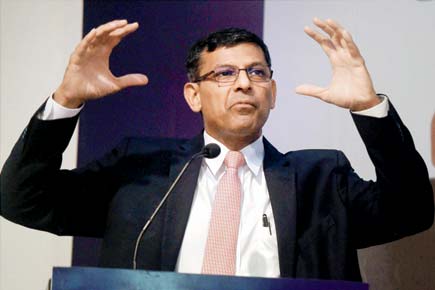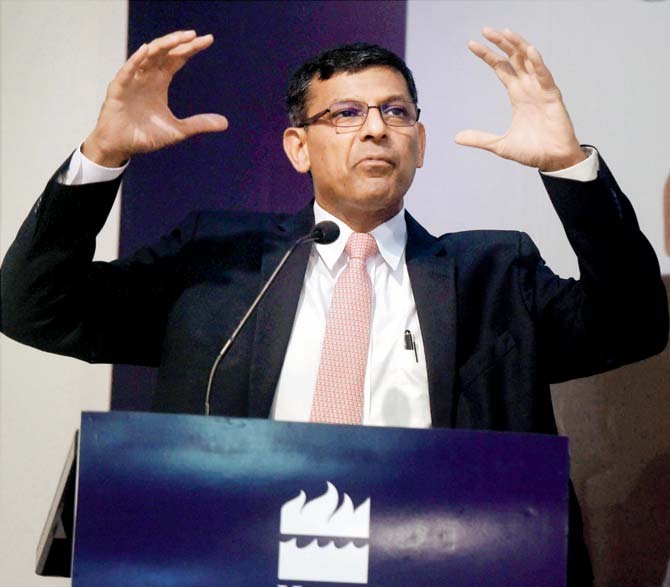A nation that stays quiet after the killings of intellectuals does not realise that it is no better than pointing a gun at our own head


Former RBI governor Raghuram Rajan at the launch of his new book 'I do What I do' in Mumbai on Friday. Pic/PTI
 Activist-rationalist-journalist Gauri Lankesh was on the Times of India newsdesk in Delhi when I began journalism in 1987 as a local reporter. I remember her sitting in the large, open newsroom at the main desk with two other women, Bhavdeep and Chandrika; all three giggled when, on a Saturday afternoon, I came to office in shorts (an unusual thing then), so I generally avoided them. My spouse joined the TOI desk a year later and knew Gauri better. I did not run into Gauri again after each of us left TOI; she became a committed activist after her father's death and though there was occasion to meet during my four years living in the south, we never did.
Activist-rationalist-journalist Gauri Lankesh was on the Times of India newsdesk in Delhi when I began journalism in 1987 as a local reporter. I remember her sitting in the large, open newsroom at the main desk with two other women, Bhavdeep and Chandrika; all three giggled when, on a Saturday afternoon, I came to office in shorts (an unusual thing then), so I generally avoided them. My spouse joined the TOI desk a year later and knew Gauri better. I did not run into Gauri again after each of us left TOI; she became a committed activist after her father's death and though there was occasion to meet during my four years living in the south, we never did.
ADVERTISEMENT
Nonetheless, the news on Tuesday night of Gauri being shot dead was a physical blow. What kind of monster thinks it's his right to take another's life, I wondered. Also, I was scared. Anyone can be murdered: Any time, anywhere. It chills your blood to think of being shot dead. Even if the killing of an insignificant person like me were to draw a few moments of outrage, eventually people would move on with their lives; and that would be it. This is of course the nature of memory and grief — we are given short memories so that we can cope with grief, otherwise we would be forever overwhelmed. Still, one can't escape feeling that existence is tenuous and meaningless.
And despite this, we believe in principles rather than self-interest. That's why I admire intellectuals who have the courage to speak truth to power; particularly when power is ugly and poses an existential threat to the defiant individual.
One such is Raghuram Rajan, former Reserve Bank of India (RBI) governor, who has lately been promoting his book I Do What I Do. His interviews clearly dispel misconceptions about his role in the government's sudden move last
November to demonetise the Rs 500 and Rs 1,000 notes. The recently-released annual RBI report and the latest quarterly GDP growth figures show that demonetising was disastrous. Ruling party cheerleaders have continually tried to push alt-narratives, and not even with consistency. Sadly, some still believe the government's ever-changing lies: For instance, that demonetising's success is demonstrated by the GDP fall since that (magically) demonstrates the
incorporation of black money into the economy.
Rajan made it clear that he told the government that it was not a good idea in the short-term for some elusive long-term benefits. Numbers show that not only has the economy slowed and companies have failed, but the government also has not made much headway against black money — Prime Minister Narendra Modi's original stated aim. With each passing day, India has not seen any turnaround from demonetising's debilitating effects. Farm prices still face deflationary pressures. Rajan said that the more drawn-out this is, the more it will hurt investor sentiment, which can't be good for a country seeking investment to realise its high-growth potential. He put a number to the loss to India's economy: R1,00,000 crore.
Rajan also spoke of the high-volume trolls, who defend Modi's government's every wrong move, as an "idiocracy". (Perhaps this idiocracy will soon attempt to assassinate Rajan's character.) Truer words were never spoken. Gauri's murder has incensed me so much that I now avoid my pro-Modi friends. No longer does their cheerleading seem harmless. They quote her brother, who had an axe to grind with her, to say that we must wait to see who killed Gauri rather than accuse the right wing. One, who can wait when the police hasn't still solved the 2015 murder of former Kannada University vice-chancellor MM Kalburgi?
Two, Gauri was murdered three days after the expansion of Modi's council of ministers, in which one of the inductees is Anantkumar Hegde, the representative from Uttara Kannada who faces more heinous cases than Lalu Prasad of Bihar. Hegde has not only slapped doctors on camera (prompting the Indian Medical Association to protest to Modi about Hegde's promotion to minister), but his record of violence goes way back to 25 years ago. By inducting him, Modi has clearly signalled to others like Hegde that not only does he not mind their violence, but it is a path for political career growth. Obviously, when the PM rewards a bad man, he encourages others to be bad. It is only natural then, as a BJP MLA said, that a woman who dared to write against the RSS would be murdered.
Yet, Hegde and others who might emulate him are not the only culprits. Those who silently or otherwise applaud the killing of 'presstitutes' and 'intellectuals', and who accuse others of 'weaponising' Gauri's murder are equally to blame. And they're not bright either, not realising that killing an intellectual is tantamount to the nation putting a gun to its own head, and pulling the trigger.
Aditya Sinha's crime novel, The CEO Who Lost His Head, is available now. He tweets @autumnshade. Send your feedback to mailbag@mid-day.com
 Subscribe today by clicking the link and stay updated with the latest news!" Click here!
Subscribe today by clicking the link and stay updated with the latest news!" Click here!







